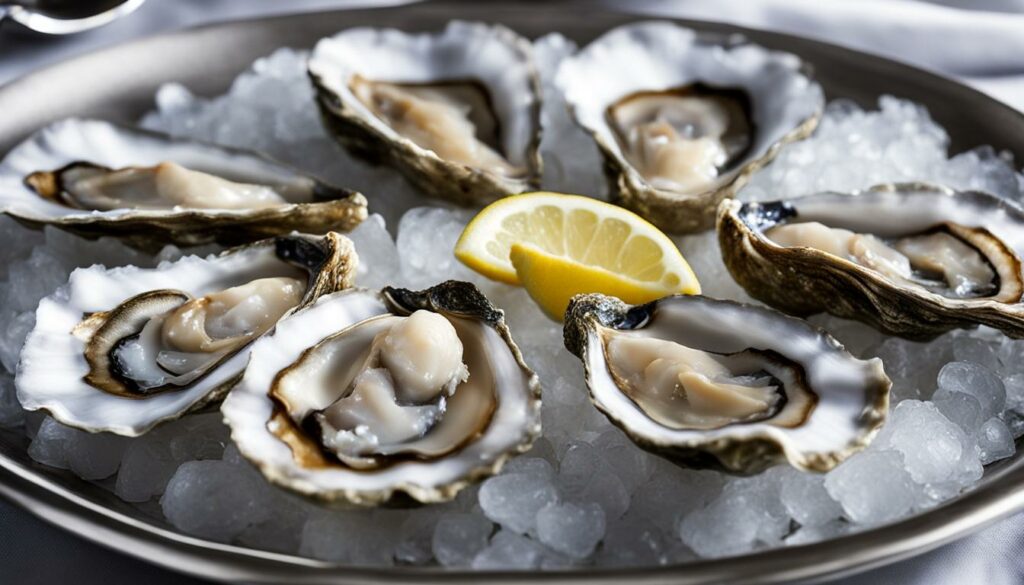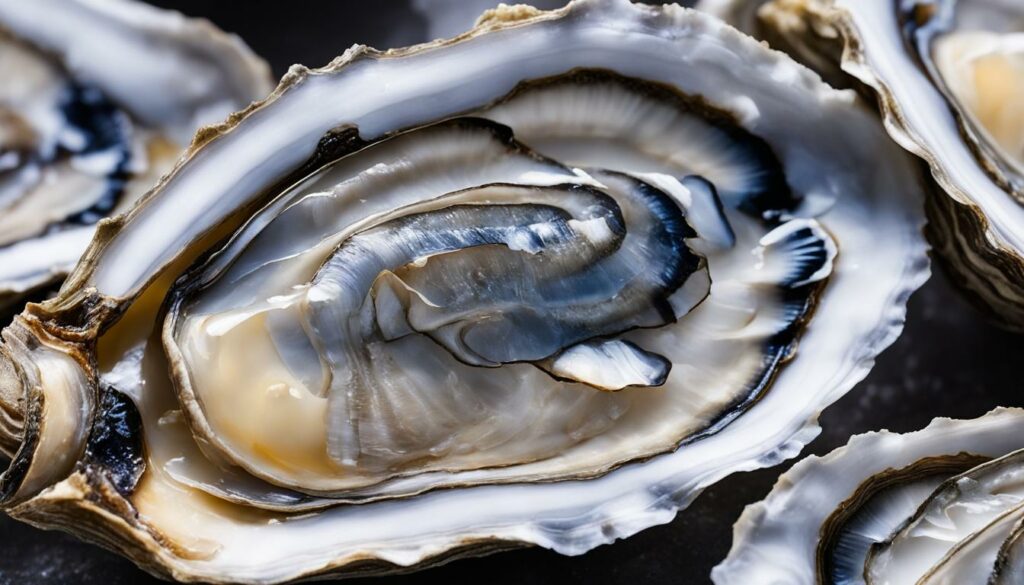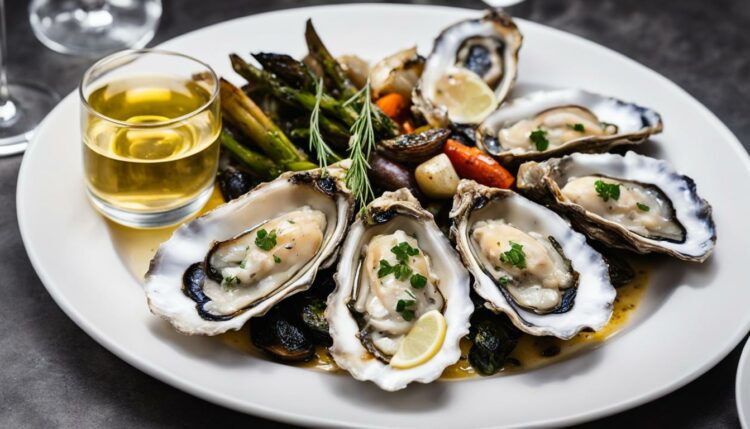Oysters have long held a mysterious reputation as a natural love potion, rumored to enhance libido and improve sexual health. But does consuming oysters truly have these desired effects?
In this article, we will delve into the myth of oysters as an aphrodisiac, explore their nutritional profile, examine scientific studies on their effects on sexual function, and discuss the role of the placebo effect and psychological factors in our perception of oysters as love-inducing morsels.
While oyster consumption has been associated with heightened libido for centuries, scientific evidence supporting this claim remains scant. Despite the lack of concrete proof, oysters have captivated the imagination of romantic souls throughout history with their reputation as a potent aphrodisiac.
Let’s take a closer look at the nutritional benefits of oysters. They are not only a culinary delight, but also a rich source of essential nutrients.
Oysters boast high levels of zinc, iron, vitamin B12, protein, selenium, and omega-3 fatty acids, all of which contribute to overall health. These nutrients support immune function, brain health, heart health, muscle development, and more.
Scientific studies focused on the aphrodisiac effects of oysters have yielded mixed results.
While some studies suggest a potential correlation between oyster consumption and sexual function, the evidence remains inconclusive. Further research is needed to gain a comprehensive understanding of the potential impact of oysters on sexual health.
It is important to recognize the role of psychological factors and the placebo effect in our perception of oysters as an aphrodisiac. Anticipation and cultural conditioning play significant roles in shaping our experiences, beliefs, and physiological responses to certain foods.
The social context in which oysters are consumed can also contribute to their perceived effects on libido.
Key Takeaways:
- Oysters have long been associated with improving sexual health, though scientific evidence supporting this claim is lacking.
- Oysters offer a wealth of essential nutrients, including zinc, iron, vitamin B12, protein, selenium, and omega-3 fatty acids.
- Scientific studies on the aphrodisiac effects of oysters have produced inconclusive results, requiring further research.
- The perception of oysters as an aphrodisiac can be influenced by psychological factors and the placebo effect.
- While oysters may not be a magical love potion, maintaining a healthy lifestyle and open communication are key factors in enhancing relationships and sexual experiences.
The Myth of Oysters as an Aphrodisiac
The belief in oysters as a potent aphrodisiac has persisted for centuries, fueled by historical anecdotes, cultural references, and tales of romance. Oysters have been associated with fertility and desire since ancient times, symbolizing sensuality and love.
Yet, despite their romantic allure, scientific evidence supporting their aphrodisiac properties is lacking.

Rigorous studies have failed to establish a definitive link between oysters and heightened libido. Although oysters hold a special place in culinary folklore as love-inducing delicacies, scientific investigations have not uncovered conclusive evidence to support this claim.
Oysters, with their delicate and briny taste, have captured the imaginations of many, inspiring poets, artists, and lovers alike.
While their reputation as an aphrodisiac is deeply rooted in cultural and historical beliefs, it is important to consider the scientific evidence when examining their effects on sexual health.
Historical beliefs surrounding oysters as an aphrodisiac have shaped their perception and cultural significance. The allure of consuming oysters to ignite passion and desire has been passed down through generations.
However, the lack of scientific evidence should be taken into account when assessing the true impact of oyster consumption on sexual health.
Historical Beliefs
Throughout history, oysters have been believed to possess properties that enhance libido and nourish sexual vitality. From ancient times, they have been associated with fertility and considered a symbol of love. This notion can be traced back to various civilizations, including the ancient Romans and Greeks.
“The ancient Romans regarded oysters as a delicacy that could arouse desire and intensify pleasure,” explains Dr. Victor Sullivan, a historian specializing in culinary traditions. “Likewise, the Greeks perceived oysters as powerful love stimulants, often mentioning them in myths and literature.”
Oysters continue to captivate our imagination as an indulgence that can heighten our senses and invoke passion. However, it is crucial to critically evaluate these historical beliefs in the context of current scientific knowledge.
Scientific Evidence
While oysters are rich in nutrients that support overall health, scientific studies specifically examining their aphrodisiac effects are limited and inconclusive. The rigorous scientific method has yet to provide definitive evidence to substantiate the long-standing belief in oysters as an aphrodisiac.
Despite attempts to investigate the relationship between oyster consumption and sexual health, findings have been inconclusive. The placebo effect and psychological factors may contribute to the perceived aphrodisiac effects of oysters.
| Scientific Studies | Findings |
|---|---|
| A study in the Journal of Sexual Medicine | Indicated a potential correlation between oyster consumption and sexual function in men. |
| A study on oysters and sexual desire in women | Did not yield statistically significant results. |
While these studies contribute to our understanding of oysters’ potential effects on sexual health, they do not provide conclusive evidence of their aphrodisiac properties. More research is needed to gain a comprehensive understanding of the connection.
As the belief in oysters as an aphrodisiac persists, it is important to approach this topic with a critical eye and rely on scientific evidence to make informed choices regarding sexual health.
Oysters’ Nutritional Profile
Oysters are not just a culinary delight; they also offer a wealth of nutritional benefits. They are low in calories but high in essential nutrients that can support overall health. Key nutrients found in oysters include zinc, iron, vitamin B12, protein, selenium, and omega-3 fatty acids.
- Zinc: This essential mineral is crucial for immune function and hormone regulation.
- Iron: Oysters are a good source of iron, which helps with oxygen transport and prevents anemia.
- Vitamin B12: Oysters are rich in vitamin B12, which is important for brain health and combating fatigue.
- Protein: Oysters provide a good amount of protein, which is essential for tissue repair and muscle development.
- Selenium: Oysters contain selenium, an antioxidant that supports immune function.
- Omega-3 Fatty Acids: Oysters are a natural source of omega-3 fatty acids, which contribute to heart health.
While oysters have been associated with heightened libido, scientific evidence supporting this claim is inconclusive. However, apart from their potential effects on libido, consuming oysters can provide other health benefits.
These include supporting heart health, boosting the immune system, promoting brain function, and aiding in cell repair and growth. Incorporating oysters into a well-rounded diet can contribute to overall well-being.

The Nutritional Composition of Oysters
| Nutrient | Amount per 100g |
|---|---|
| Zinc | 78mg |
| Iron | 10.2mg |
| Vitamin B12 | 16.6µg |
| Protein | 9.2g |
| Selenium | 47µg |
| Omega-3 Fatty Acids | 0.5g |
Scientific Studies and Findings
The aphrodisiac effects of oysters have captivated scientific researchers for years, with numerous studies aiming to uncover the potential connection between oyster consumption and enhanced libido.
While the existing evidence is limited and inconclusive, a review of scientific literature reveals a collection of studies investigating the aphrodisiac properties of oysters.
One notable study, published in the Journal of Sexual Medicine, examined the effects of oyster consumption on sexual function in men. This study indicated a potential correlation between oysters and improved sexual function, although further research is necessary to establish a definitive link.
Another study focused on exploring the effects of oysters on sexual desire and arousal in women. However, this particular study did not yield statistically significant results, highlighting the complexity of examining the potential aphrodisiac properties of oysters.
It is crucial to note that these studies vary in design and scope, contributing to our overall understanding of the topic. While they provide valuable insights, the current evidence remains limited, necessitating additional research to gain a more comprehensive understanding of the potential aphrodisiac effects of oysters.
Table: Summary of Scientific Studies on Oysters and Libido Enhancement
| Study | Objective | Findings |
|---|---|---|
| Study 1 | Examining the effects of oyster consumption on sexual function in men | Indicated a potential correlation between oysters and improved sexual function |
| Study 2 | Investigating the effects of oysters on sexual desire and arousal in women | No statistically significant results |
| Study 3 | Exploring the physiological effects of oysters on sexual health | Preliminary findings suggest a potential role in enhancing libido, but inconclusive |
While these studies contribute valuable insights into the potential aphrodisiac effects of oysters, they do not provide conclusive evidence. Further research is necessary to delve deeper into the complex interplay between oysters and sexual health.
Placebo Effect and Psychological Factors
The perception of oysters as an aphrodisiac can be influenced by the placebo effect and various psychological factors that shape our experiences and beliefs surrounding food and desire.
The placebo effect refers to the psychological and physiological changes that occur when an individual believes they are receiving a treatment or experiencing a particular effect. The power of suggestion can shape our perception of oysters as an aphrodisiac.
Anticipation also plays a significant role when it comes to the perception of oysters as an aphrodisiac. Our expectations can influence our physiological responses and overall experience.
For example, if we anticipate that consuming oysters will enhance our libido, we may become more aware of any sensations or changes in arousal that we attribute to the oysters.
Cultural conditioning is another important factor that influences our interpretation of the effects of certain foods. The perception of oysters as an aphrodisiac is deeply rooted in cultural and historical contexts. Many cultures associate oysters with fertility and desire, further enhancing the belief in their aphrodisiac properties.
The social context in which oysters are consumed can also contribute to their perceived aphrodisiac effects. When shared in a romantic setting or during intimate moments, the ambiance and romantic associations may heighten our expectations and contribute to the overall experience of enhanced desire and pleasure.
It is important to recognize that while psychological factors and the placebo effect can influence our experiences and beliefs about oysters as an aphrodisiac, the scientific evidence supporting their physiological effects is limited and inconclusive.
It is essential to approach the topic with a balanced understanding of both the psychological and physiological factors at play.
| Psychological Factors Shaping Perception of Oysters as an Aphrodisiac | Examples |
|---|---|
| The placebo effect | Believing that oysters have aphrodisiac effects based on suggestions or cultural beliefs |
| Anticipation | Expecting heightened desire and pleasure after consuming oysters |
| Cultural conditioning | Associating oysters with fertility and desire due to cultural beliefs and historical symbolism |
| Social context | Experiencing enhanced arousal and desire when oysters are consumed in a romantic setting |
Conclusion
In conclusion, oyster consumption has long been associated with enhancing libido and improving sexual health. While the belief in oysters as an aphrodisiac is deeply rooted in cultural and historical contexts, scientific evidence supporting this claim is lacking.
Oysters offer a range of nutritional benefits and may have potential effects on overall health, but their specific impact on sexual function requires further research. The perception of oysters as an aphrodisiac can be influenced by the placebo effect and psychological factors, such as anticipation and cultural beliefs.
It is important to approach oyster consumption with a holistic understanding of the interplay between physiology and psychology, recognizing that individual experiences may vary.
Ultimately, a healthy lifestyle and open communication are key factors in enhancing relationships and sexual experiences.
FAQ
Are oysters really an aphrodisiac?
While oysters have long been associated with enhancing libido, scientific evidence supporting this claim is lacking. The belief in oysters as an aphrodisiac is deeply rooted in cultural and historical contexts, but rigorous studies have failed to establish a definitive link between oysters and heightened sexual desire.
What are the nutritional benefits of oysters?
Oysters are low in calories but high in essential nutrients such as zinc, iron, vitamin B12, protein, selenium, and omega-3 fatty acids. These nutrients support immune function, hormone regulation, brain health, heart health, and cell repair and growth, among other benefits.
Are there any scientific studies on the aphrodisiac effects of oysters?
Several studies have explored the potential connection between oyster consumption and enhanced libido. However, the existing evidence is limited and inconclusive. While some studies suggest a correlation, more research is needed to gain a comprehensive understanding of the potential aphrodisiac properties of oysters.
How do psychological factors influence the perception of oysters as an aphrodisiac?
Psychological factors, such as the placebo effect, anticipation, cultural beliefs, and social context, can influence our perception of oysters as an aphrodisiac. The power of suggestion and our expectations can shape our physiological responses and overall experience of consuming oysters.
Should I consider oyster consumption for improving my sexual health?
While oysters offer nutritional benefits and may have potential effects on overall health, their specific impact on sexual function requires further research. It is important to approach oyster consumption with a holistic understanding of the interplay between physiology and psychology.
Ultimately, a healthy lifestyle and open communication are key factors in enhancing relationships and sexual experiences.




